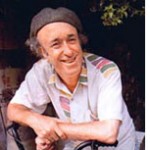By Dan Bloom

CHIAYI CITY, Taiwan — Whenever a new literary genre comes of age, when its time arrives, it signals a small shift in public awareness.
Before sci-fi arrived on the scene in the 1920s, via short stories in science fiction magazines that set the stage for future SF writers like Isaac Asimov, Harlen Corben and David Brin, the public in Europe and America was still living in the dark ages, it seems.
And now, with a rising new genre dubbed “cli-fi” on the scene, a new kind of public awareness mirrors the dilemma humankind is in as climate change and man-made global warming put a new agenda on the table. Sci-fi gave birth to cli-fi in a way, and the real heroes of the new genre for both movies and novels will be the Hollywood directors and novelists themselves who will be doing the heavy lifting, telling their stories and giving shape to their visions.
David Brin is the author of two important sci-fi novels, Earth and Existence.’ So I reached out to him the other day by email to find out more about the evolution of literary genres.
“My novel Earth portrayed climate change flooding way back in 1989. So does my novel ‘Existence’ which depicts the Chinese building a New Great Wall along the eastern coast, to keep the sea out,” he told me.
“In your column, you might also mention the most notable Chinese sci-fi writer, Liu Cixin. You should also mention examples of cli-fi such John Barnes’s novel The Mother of All Storms and the Hollywood movie The Day After Tomorrow,” Brin added. “The examples are more important than philosophy here since they create an impression in the reader’s mind.”
My own take on this? In the end, the ”stories” writers and movie directors tell will be everything, no matter what the genre is. While the many newspaper articles about cli-fi have been important, the real work — the heavy lifting — will be done by the writers themselves, male and female, young and old, and not just in English-speaking countries.
Imagine Amos Oz sitting down in Israel to write a cli-fi novel in Hebrew.
I feel that what is important now about cli-fi are the coming cli fi novels and movies that will be written and released in the next 35 years, from 2015 to 2050, in many nations.
We need the real artists speaking in their cli-fi voices and with their cli-fi visions and cli-fi stories.
Newspaper columns and op-eds about the “mushrooming genre of cli-fi,” as the New York Times put it a year ago, are just ”media backgrounders” to jump start the engines.
The real heroes will be the writers, the movie directors. And their time is coming.
It takes a while before a literary genre evolves and reaches its audience, and before its storytellers gather enough steam to pitch their novels and movies to publishers and producers.
The next 35 years will be pivotal, and literature and cinema will never be the same.
Who will these cli-fi ”heroes” be? Perhaps some of them are reading these words right now.
Final word: I asked California writer Scott Thill about all this and he told me by email: “Cli-fi creatives will have no choice but to analyze and explore their globally warmed, weirding world, which in turn was created by a much narrower, more narcissistic sci-fi. The exponentially transformed Earth will force their hearts and minds.”
*
Bloom, based in Taiwan, is a cli-fi enthusiast and inveterate web surfer. He may be contacted via dan.bloom@sdjewishworld.com, or you may comment on the web according to the instructions below.